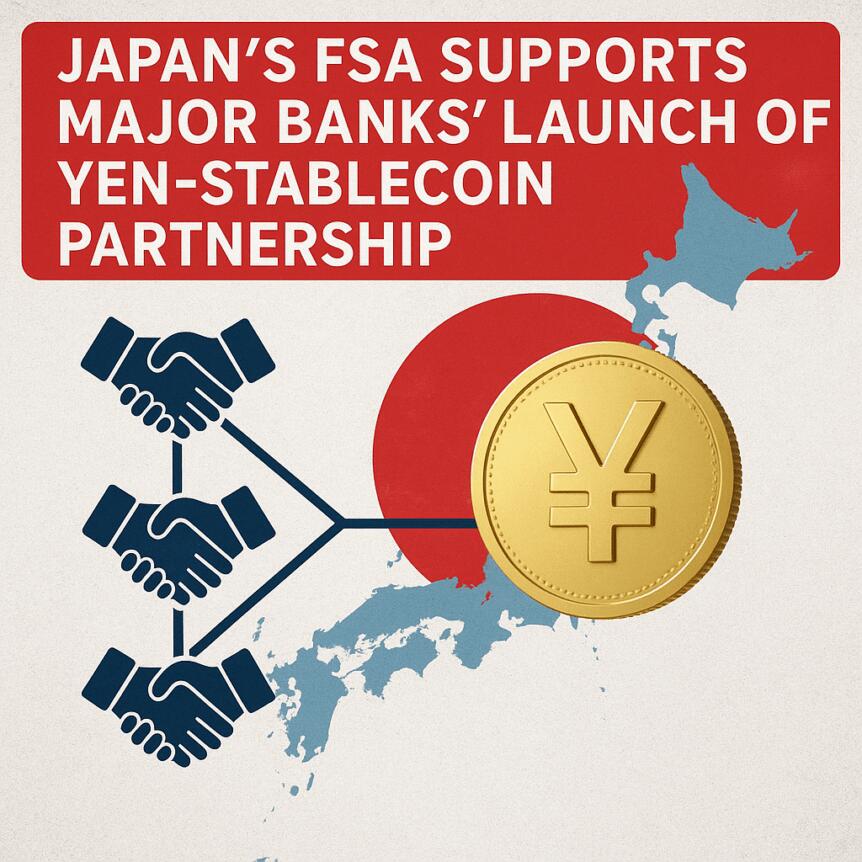Japan’s financial regulators are making significant strides toward integrating blockchain technology into the mainstream financial system. Recently, the Financial Services Agency (FSA) announced its endorsement of a collaborative project among leading financial giants to issue yen-backed stablecoins, signaling a major move toward modernizing corporate settlements and streamlining payments through cryptocurrency.
- The FSA approves a joint initiative by Japan’s top banks and corporations to issue yen-backed stablecoins.
- The project aims to improve payment efficiency, reduce transaction costs, and foster innovation in Japan’s financial sector.
- Major institutions including Mizuho, MUFG, Sumitomo Mitsui, and Progmat will partake in the pilot program.
- The pilot phase is set to commence immediately, with plans to publish detailed results post-implementation.
- This move aligns with Japan’s broader efforts to regulate and promote the integration of cryptocurrencies into its financial ecosystem.
History of Japan’s Stablecoin Endeavors
In a recent statement, the FSA outlined its “Payment Innovation Project,” aimed at harnessing blockchain technology to improve payment systems. The initiative involves Japanese financial institutions such as Mizuho Bank, Mitsubishi UFJ Bank, and Sumitomo Mitsui Banking Corporation, alongside corporate giant Mitsubishi Corporation and its subsidiary Progmat, which already operates MUFG’s stablecoin issuance platform.
This collaboration follows recent reports that these institutions plan to leverage their yen-based stablecoin platform to modernize corporate settlements and cut transaction costs. Serving over 300,000 corporate clients, these entities are at the forefront of Japan’s push to innovate within its traditional banking landscape.
Starting this month, these companies will begin issuing payment stablecoins, a move intended to boost user convenience, increase corporate efficiency, and foster wider adoption of blockchain solutions in Japan’s financial markets.
The regulator emphasized that protecting user interests and transparency will be priorities during this pilot. “After the pilot concludes, the FSA will publish comprehensive findings and insights,” the agency stated.
The efforts come shortly after the launch of Tokyo-based fintech firm JPYC’s yen-backed stablecoin, which has already attracted several corporate adopters. JPYC’s president Noriyoshi Okabe noted that seven companies are actively preparing to integrate the new stablecoin into their operations.
Japan’s Broader Crypto Regulatory Environment
Alongside these developments, Japanese regulators have been intensifying their oversight of the crypto industry. Notably, regulatory bodies are establishing new rules for the crypto markets. Recently, Bybit, the world’s second-largest crypto exchange by trading volume, announced it would halt new user registrations in Japan to comply with evolving regulations.
In addition, authorities are exploring policies that could permit banks to hold and invest in cryptocurrencies like Bitcoin. Reports indicate that the FSA is reviewing regulatory frameworks to facilitate such banking activities, signaling a more accommodating stance toward digital assets. Furthermore, efforts are underway to tighten enforcement against crypto insider trading, granting authorities like the Securities and Exchange Surveillance Commission additional investigative powers and penalties for violations.
This regulatory evolution suggests Japan is aiming to strike a balance between fostering innovation and safeguarding investor interests, positioning itself as a proactive leader in the global crypto and blockchain ecosystem.







